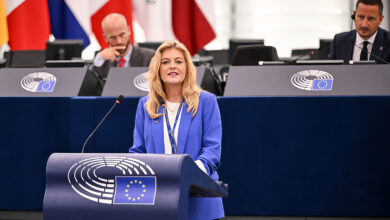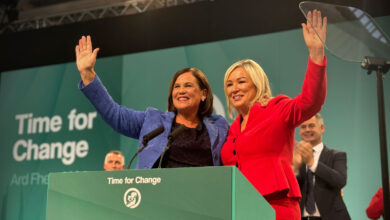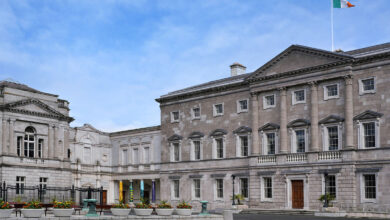Politicians debate their sustainability priorities
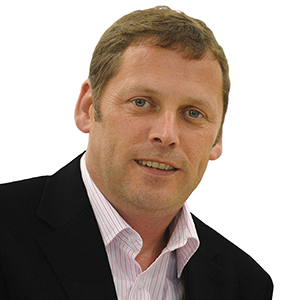
Green Party leader Eamon Ryan and Fianna Fáil sustainability spokesperson Barry Cowen TD discussed their respective parties’ sustainable development policies at the 2015 Environment Ireland conference.
Green Party leader Eamon Ryan and Fianna Fáil sustainability spokesman Barry Cowen TD took part in a panel discussion at the 2015 Environment Ireland conference, chaired by Irish Times’ journalist Paddy Woodworth. The ensuing discussion allowed both politicians to debate their policies and views regarding Ireland’s sustainable development priorities with attending delegates.
In his opening remarks Ryan made it clear that our energy focus must change. Energy must switch to that of renewables. “For 40,000 years we were nomads, during which time mythology was the key driver behind mankind’s rationale for living,” he said.
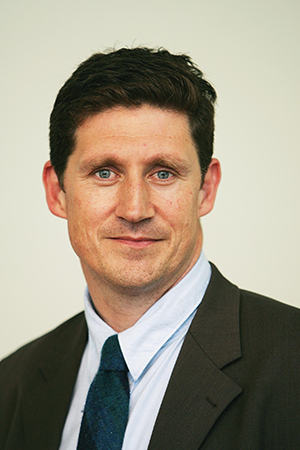 “Once agriculture rose to prominence, more settled communities became the norm with theology becoming the driver for cultural development. At around the same time communication went from script to print then went to ideology. This then led to the evolution of psychology in the 20th century.”
“Once agriculture rose to prominence, more settled communities became the norm with theology becoming the driver for cultural development. At around the same time communication went from script to print then went to ideology. This then led to the evolution of psychology in the 20th century.”
Ryan postulated that the current internet revolution, in tandem with the growing use of renewables will bring about a new global culture: one based on ecology. “Green thinking will be crucially important in this new world,” he said.
“The general public are angry with those politicians who try to serve up age old policies, which are not fit for purpose when it comes to meeting the sustainability challenges of the 21st century. The old conservativism is not working. Increasing numbers of people are becoming angry at the total lack of vision which the current government has when it comes to developing a sustainable future for Ireland.
“Green thinking is revolutionary. And the great hope, in this regard, is that a combination of digital and renewable energy technologies can be brought to bear in an interconnected way, thereby plotting a sustainable future for this country.”
Barry Cowen confirmed that everyone depends on the environment. “We need to use it, but it must not be lost to us,” he said. “Politics is cyclical. We are currently at a crossroads, with regard to the advancement of energy policy in Ireland. And I recognise the great harm that can be done to the environment, if we get it wrong. The challenge of sustainability is not lost on Fianna Fáil. It is an issue that has already been reflected across a wide spectrum of our policies for the future.
“The challenge of the environment straddles many government departments. But above all else, we need a clear and concise energy policy. One that’s adds up financially while, at the same time, is wholly respectful of the need to maintain a sustainable environment. And I do not underestimate the scale of this challenge moving forward.
Cowen refuted the suggestion that political parties do not see the issue of climate change as being of key importance and that Irish citizens have not been provided with clear policy options, where this matter is concerned.
“The lack of binding targets with regard to climate change must be addressed,” he said. “Fianna Fail is seeking to highlight this matter in very precise and effective terms. We need to get clear and binding targets built into government policy where greenhouse gases are concerned. And to do this we must look beyond the current legislation.
The Green Party leader defended the actions taken by his party while in partnership government with Fianna Fáil. He pointed out that it is extremely difficult for a junior party in a coalition to effect major change across the entire spectrum of government activity. “Emissions reduced by 14 per cent during our years in government,” said Ryan. “Admittedly, half of this was accounted for by the downturn in the economy. But the remainder was accounted for by government legislation.”
Looking to the future Ryan said that policy makers must have the public fully on board when it comes to making decisions on Ireland’s sustainable future. “And this must percolate right down to town, village and parish level. We need full public agreement on these matters that are of vital national interest. And everything is possible, public opinion is changing. The communications’ revolution that is now taking place has the power to educate people more fully on their sustainability options for the future. And this is already happening.
“Increasingly, the public recognise the benefits of green policies. But more than this, they also view sustainability as the only show in town. There is no Plan B. Taking the earth’s resource without any recourse to maintaining their value for future generations has only one end point. And it’s one that provides us with no future at all.”
Commenting on the current fracking controversy, Barry Cowen said that the implementation of the technology is not compatible with the best interests of the Irish countryside. “And most members of the Fianna Fáil party feel this way. Our upcoming election manifesto will reflect this.
Cowen also pointed out that the world’s dependence on oil must diminish. “The upcoming United Nations Climate Change Conference, taking place in Paris, will allow for a full and frank debate on this issue,” he said. “Its clear objective will be to achieve a binding and universal agreement on climate, from all the nations of the world. And in this regard we must have India and the European Union fully on board.
Eamon Ryan expressed the view that the world must become a zero carbon planet by 2050. “Oil is the most incredibly energy dense substance that is available to us. This is why it has become so entrenched at the very core of our economy and way of life. Renewable energy sources, however, are much more distributive in nature. This is why we must combine their development with a greater use of digital communication technologies.
“All of this hinges on educating our young people properly. I was taken aback recently when finding out that questions on the anatomical structure of the earthworm still feature in Leaving Cert examination papers. I thought that we had left the 20th century behind us: but, seemingly, this is not the case.
Both Cowen and Ryan agreed that Dáil members need to be more on top of what is happening at EU level.
“So much of our national legislation is now based on agreements thrashed out in Brussels,” stressed the Green party leader. “So it is crucially important for all our local politicians to get involved in the EU debate on sustainability at all levels.”
Ryan characterised Pope Francis’ recent encyclical on the environment as a potential game changer where policies relating to global sustainability are concerned. “The upcoming Paris summit will be a turning point for the world,” he said. “And the Pope’s recent thoughts will form a fitting backdrop for the discussions that will take place amongst world leaders in a few weeks’ time.
“But, fundamentally, we need to make an evolutionary leap forward, where sustainability is concerned. This will involve putting a love of the environment at centre stage, with regard to everything that we do and we must be proactive. Doing nothing is not an option.”

